- Home
- Fredric Brown
The Second Fredric Brown Megapack: 27 Classic Science Fiction Stories Page 15
The Second Fredric Brown Megapack: 27 Classic Science Fiction Stories Read online
Page 15
McGarry stood there trembling. So long a wait, and so sudden an end to it. He touched his left shoulder and touched the five-legged pet that felt to his fingers as well as to his naked shoulder so like a woman’s hand.
“Dorothy,” he said, “it’s—” He ran out of words.
The spacer was closing in for a landing now. McGarry looked down at himself, suddenly aware and ashamed of himself, as he would look to a rescuer. His body was naked except for the belt that held his holster and from which dangled his knife and a few other tools. He was dirty and probably smelled, although he could not smell himself. And under the dirt his body looked thin and wasted, almost old, but that was due of course to diet deficiencies; a few months of proper food, Earth food, would take care of that.
Earth! The green hills of Earth!
He ran now, stumbling sometimes in his eagerness, toward the point where the spacer was landing. He could see now that it was a one-man job, like his own had been. But that was all right; it could carry two in an emergency, at least as far as the nearest planet where he could get other transportation back to Earth. To the green hills, the green fields, the green valleys.
He prayed a little and swore a little as he ran. There were tears running down his cheeks.
He was there, waiting, as the door opened and a tall slender young man in the uniform of the Space Patrol stepped out.
“You’ll take me back?” he shouted.
“Of course,” said the young man calmly. “Been here long?”
“Five years!” McGarry knew that he was crying, but he couldn’t stop.
“Good Lord!” said the young man. “I’m Lieutenant Archer. Of course I’ll take you back, man, as soon as my jets cool enough for a takeoff. I’ll take you as far as Carthage, on Aldebaran II, anyway; you can get a ship out of there for anywhere. Need anything right away? Food? Water?”
McGarry shook his head dumbly. Food, water—What did such things matter now?
The green hills of Earth! He was going back to them. That was what mattered, and all that mattered. So long a wait, then so sudden an ending. He saw the violet sky swimming and then it suddenly went black as his knees buckled under him.
He was lying flat and the young man was holding a flask to his lips and he took a long draught of the fiery stuff it held. He sat up and felt better. He looked to make sure the spacer was still there; it was, and he felt wonderful.
The young man said, “Buck up, old-timer; we’ll be off in half an hour. You’ll be in Carthage in six hours. Want to talk, till you get your bearings again? Want to tell me all about it, everything that’s happened?”
They sat in the shadow of a brown bush, and McGarry told him about it, everything about it. The five-year search for the other ship he’d read had crashed on the planet and which might have intact the parts he needed to repair his own ship. The long search. About Dorothy, perched on his shoulder, and how she’d been something to talk to.
But somehow, the face of Lieutenant Archer was changing as McGarry talked. It grew even more solemn, even more compassionate.
“Old-timer,” Archer asked gently, “what year was it when you came here?” McGarry saw it coming. How can you keep track of time on a planet whose sun and seasons are unchanging? A planet of eternal day, eternal summer—He said flatly, “I came here in twenty-two forty-two. How much have I misjudged, Lieutenant? How old am I—instead of thirty, as I’ve thought?”
“It’s twenty-two seventy-two, McGarry. You came here thirty years ago. You’re fifty-five. But don’t let that worry you too much. Medical science has advanced. You still have a long time to live.”
McGarry said it softly. “Fifty-five. Thirty years.”
The lieutenant looked at him pityingly. He said, “Old-timer, do you want it all in a lump, all the rest of the bad news? There are several items of it. I’m no psychologist but I think maybe it’s best for you to take it now, all at once, while you can still throw into the scale against it the fact that you’re going back. Can you take it, McGarry?”
There couldn’t be anything worse than he’d learned already. The fact that thirty years of his life had already been wasted here. Sure, he could take the rest of whatever it was, as long as he was getting back to Earth, green Earth.
He stared at the violet sky, the red sun, the brown plain. He said, very quietly, “I can take it. Dish it out.”
“You’ve done wonderfully for thirty years, McGarry. You can thank God for the fact that you believed Marley’s spacer crashed on Kruger III; it was Kruger IV. You’d have never found it here, but the search, as you say, kept you—reasonably sane.” He paused a moment. His voice was gentle when he spoke again. “There isn’t anything on your shoulder, McGarry. This Dorothy is a figment of your imagination. But don’t worry about it; that particular delusion has probably kept you from cracking up completely.”
McGarry put up his hand. It touched his shoulder. Nothing else. Archer said, “My God, man, it’s marvelous that you’re otherwise okay. Thirty years alone; it’s almost a miracle. And if your one delusion persists, now that I’ve told you it is a delusion, a psychiatrist back at Carthage or on Mars can fix you up in a jiffy.”
McGarry said dully, “It doesn’t persist. It isn’t there now. I—I’m not even sure, Lieutenant, that I ever did really believe in Dorothy. I think I made her up on purpose, to talk to, so I’d remain sane except for that. She was—she was like a woman’s hand, Lieutenant. Or did I tell you that?”
“You told me. Want the rest of it now, McGarry?”
McGarry stared at him. “The rest of it? What rest can there be? I’m fifty-five instead of thirty. I’ve spent thirty years, since I was twenty-five, hunting for a spacer I’d never have found, since it’s on another planet. I’ve been crazy—in one way, but only one—most of that time. But none of that matters now that I can go back to Earth.”
Lieutenant Archer was shaking his head slowly. “Not back to Earth, old-timer. To Mars if you wish, the beautiful brown and yellow hills of Mars. Or, if you don’t mind heat, to purple Venus. But not to Earth, McGarry. Nobody lives there any more.”
“Earth is—gone? I don’t—”
“Not gone, McGarry. It’s there. But it’s black and barren, a charred ball. The war with the Arcturians, twenty years ago. They struck first, and got Earth. We got them, we won, we exterminated them, but Earth was gone before we started. I’m sorry, but you’ll have to settle for somewhere else.”
McGarry said, “No Earth.” There was no expression in his voice. No expression at all.
Archer said, “That’s the works, old-timer. But Mars isn’t so bad. You’ll get used to it. It’s the center of the solar system now, and there are three billion Earthmen on it. You’ll miss the green of Earth, sure, but it’s not so bad.” McGarry said, “No Earth.” There was no expression in his voice. No expression at all.
Archer nodded. “Glad you can take it that way, old-timer. It must be rather a jolt. Well, I guess we can get going. The tubes ought to have cooled enough by now. I’ll check and make sure.”
He stood up and started toward the little spacer.
McGarry’s sol-gun came out of its holster. McGarry shot him, and Lieutenant Archer wasn’t there any more. McGarry stood up and walked to the little spacer. He aimed the sol-gun at it and pulled the trigger. Part of the spacer was gone. Half a dozen shots and it was completely gone. Little atoms that had been the spacer and little atoms that had been Lieutenant Archer of the Space Patrol may have danced in the air, but they were invisible.
McGarry put the gun back into its holster and started walking toward the red splotch of jungle near the horizon.
He put his hand up to his shoulder and touched Dorothy and she was there, as she’d been there now for four of the five years he’d been on Kruger III. She felt, to his fingers and to his bare shoulder, like a woman’s hand.
He said, “Don’t worry, Dorothy. We’ll find it. Maybe this next jungle is the right one. And when we find it—”
&
nbsp; He was near the edge of the jungle now, the red jungle, and a tiger came running out to meet him and eat him. A mauve tiger with six legs and a head like a barrel. McGarry aimed his sol-gun and pulled the trigger, and there was a bright green flash, brief but beautiful—oh, so beautiful—and the tiger wasn’t there any more.
McGarry chuckled softly. “Did you see that, Dorothy? That was green, the color there isn’t much of on any planet but the one we’re going to. The only green planet in the system, and it’s the one I came from. You’ll love it.”
She said, “I know I will, Mac.” Her low throaty voice was completely familiar to him, as familiar as his own; she’d always answered him. He reached up his hand and touched her as she rested on his naked shoulder. She felt like a woman’s hand.
He turned and looked back over the brown plain studded with brown bushes, the violet sky above, the crimson sun. He laughed at it. Not a mad laugh, a gentle one. It didn’t matter because soon now he’d find the spacer so he could go back to Earth.
To the green hills, the green fields, the green valleys. Once more he patted the hand upon his shoulder and spoke to it, listened to its answer.
Then, gun at ready, he entered the red jungle.
CRISIS, 1999
The little man with the sparse gray hair and the inconspicuous bright red suit stopped on the corner of State and Randolph to buy a micronews, a Chicago Sun-Tribune of March 21st, 1999. Nobody noticed him as he walked into the corner superdrug and took a vacant booth. He dropped a quarter into the coffee-slot and while the conveyor brought him his coffee, he glanced at the headlines on the tiny three-by-four-inch page. His eyes were unusually keen; he could read those headlines easily without artificial aid. But nothing on the first page or the second interested him; they concerned international matters, the third Venus rocket, and the latest depressing report of the ninth moon expedition. But on page three there were two stories concerning crime, and he took a tiny micrographer from his pocket and adjusted it to read the stories while he drank his coffee.
Bela Joad was the little man’s name. His right name, that is; he’d gone by so many names in so many places that only a phenomenal memory could have kept track of them all, but he had a phenomenal memory. None of those names had ever appeared in print, nor had his face or voice ever been seen or heard on the ubiquitous video. Fewer than a score of people, all of them top officials in various police bureaus, knew that Bela Joad was the greatest detective in the world.
He was not an employee of any police department, drew no salary nor expense money, and collected no rewards. It may have been that he had private means and indulged in the detection of criminals as a hobby. It may equally have been that he preyed upon the underworld even as he fought it, that he made criminals support his campaign against them. Whichever was the case, he worked for no one; he worked against crime. When a major crime or a series of major crimes interested him, he would work on it, sometimes consulting beforehand with the chief of police of the city involved, sometimes working without the chief’s knowledge until he would appear in the chief’s office and present him with the evidence that would enable him to make an arrest and obtain a conviction.
He himself had never testified, or even appeared, in a courtroom. And while he knew every important underworld character in a dozen cities, no member of the underworld knew him, except fleetingly, under some transient identity which he seldom resumed.
Now, over his morning coffee, Bela Joad read through his micrographer the two stories in the Sun-Tribune which had interested him. One concerned a case that had been one of his few failures, the disappearance—possibly the kidnapping—of Dr. Ernst Chappel, professor of criminology at Columbia University. The headline read NEW LEAD IN CHAPPEL CASE, but a careful reading of the story showed the detective that the lead was new only to the newspapers; he himself had followed it into a blind alley two years ago, just after Chappel had vanished. The other story revealed that one Paul (Gyp) Girard had yesterday been acquitted of the slaying of his rival for control of North Chicago gambling. Joad read that one carefully indeed. Just six hours before, seated in a beergarten in New Berlin, Western Germany, he had heard the news of that acquittal on the video, without details. He had immediately taken the first stratoplane to Chicago.
When he had finished with the micronews, he touched the button of his wrist model timeradio, which automatically attuned itself to the nearest timestation, and it said, just loudly enough for him to hear, “Nine-oh-four.” Chief Dyer Rand would be in his office, then.
Nobody noticed him as he left the superdrug. Nobody noticed him as he walked with the morning crowds along Randolph to the big, new Municipal Building at the corner of Clark. Chief Rand’s secretary sent in his name—not his real one, but one Rand would recognize—without giving him a second glance.
Chief Rand shook hands across the desk and then pressed the intercom button that flashed a blue not-to-be-disturbed signal to his secretary. He leaned back in his chair and laced his fingers across the conservatively small (one inch) squares of his mauve and yellow shirt. He said, “You heard about Gyp Girard being acquitted?”
“That’s why I’m here.”
Rand pushed his lips out and pulled them in again. He said, “The evidence you sent me was perfectly sound, Joad. It should have stood up. But I wish you had brought it in yourself instead of sending it by the tube, or that there had been some way I could have got in touch with you. I could have told you we’d probably not get a conviction. Joad, something rather terrible has been happening. I’ve had a feeling you would be my only chance. If only there had been some way I could have got in touch with you—”
“Two years ago?”
Chief Rand looked startled. “Why did you say that?”
“Because it was two years ago that Dr. Chappel disappeared in New York.”
“Oh,” Rand said. “No, there’s no connection. I thought maybe you knew something when you mentioned two years. It hasn’t been quite that long, really, but it was close.”
He got up from behind the strangely-shaped plastic desk and began to pace back and forth the length of the office.
He said, “Joad, in the last year—let’s consider that period, although it started nearer two years ago—out of every ten major crimes committed in Chicago, seven are unsolved. Technically unsolved, that is; in five out of those seven we know who’s guilty but we can’t prove it. We can’t get a conviction.”
“The underworld is beating us, Joad, worse than they have at any time since the Prohibition era of seventy-five years ago. If this keeps up, we’re going back to days like that, and worse.”
“For a twenty-year period now we’ve had convictions for eight out of ten major crimes. Even before twenty years ago—before the use of the lie-detector in court was legalized, we did better than we’re doing now. ’Way back in the decade of 1970 to 1980, for instance, we did better than we’re doing now by more than two to one; we got convictions for six out of every ten major crimes. This last year, it’s been three out of ten.”
“And I know the reason, but I don’t know what to do about it. The reason is that the underworld is beating the lie-detector!”
Bela Joad nodded. But he said mildly, “A few have always managed to beat it. It’s not perfect. Judges always instruct juries to remember that the lie-detector’s findings have a high degree of probability but are not infallible, that they should be weighed as indicative but not final, that other evidence must support them. And there has always been the occasional individual who can tell a whopper with the detector on him, and not jiggle the graph needles at all.”
“One in a thousand, yes. But, Joad, almost every underworld big-shot has been beating the lie-detector recently.”
“I take it you mean the professional criminals, not the amateurs.”
“Exactly. Only regular members of the underworld—professionals, the habitual criminals. If it weren’t for that, I’d think—I don’t know what I’d think. Maybe that our whole theory
was wrong.”
Bela Joad said, “Can’t you quit using it in court in such cases? Convictions were obtained before its use was legalized. For that matter, before it was invented.”
Dyer Rand sighed and dropped into his pneumatic chair again. “Sure, I’d like that if I could do it. I wish right now that the detector never had been invented or legalized. But don’t forget that the law legalizing it gives either side the opportunity to use it in court. If a criminal knows he can beat it, he’s going to demand its use even if we don’t. And what chance have we got with a jury if the accused demands the detector and it backs up his plea of innocence?”
“Very slight, I’d say.”
“Less than slight, Joad. This Gyp Girard business yesterday. I know he killed Pete Bailey. You know it. The evidence you sent me was, under ordinary circumstances, conclusive. And yet I knew we’d lose the case. I wouldn’t have bothered bringing it to trial except for one thing.”
“And that one thing?”
“To get you here, Joad. There was no other way I could reach you, but I hoped that if you read of Girard’s acquittal, after the evidence you’d given me, you’d come around to find out what had happened.”
He got up and started to pace again. “Joad, I’m going mad. How is the underworld beating the machine? That’s what I want you to find out, and it’s the biggest job you’ve ever tackled. Take a year, take five years, but crack it, Joad.”
“Look at the history of law enforcement. Always the law has been one jump ahead of the criminal in the field of science. Now the criminals—of Chicago, anyway—are one jump ahead of us. And if they stay that way, if we don’t get the answer, we’re headed for a new dark age, when it’ll no longer be safe for a man or a woman to walk down the street. The very foundations of our society can crumble. We’re up against something very evil and very powerful.” Bela Joad took a cigarette from the dispenser on the desk; it lighted automatically as he picked it up. It was a green cigarette and he exhaled green smoke through his nostrils before he asked, almost disinterestedly, “Any ideas, Dyer?”

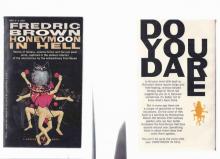 Hall of Mirrors
Hall of Mirrors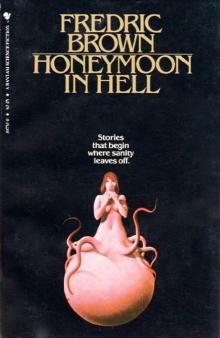 Honeymoon in Hell
Honeymoon in Hell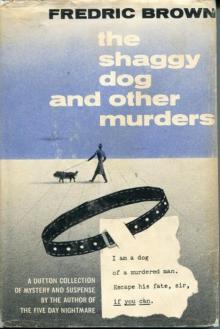 The Shaggy Dog and Other Murders
The Shaggy Dog and Other Murders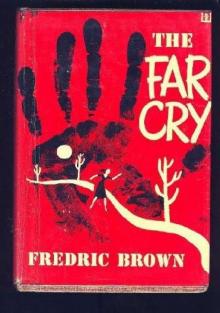 The Far Cry
The Far Cry Arena
Arena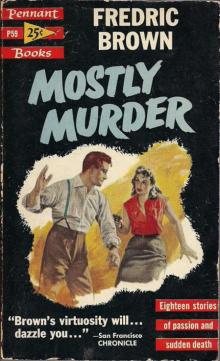 Mostly Murder
Mostly Murder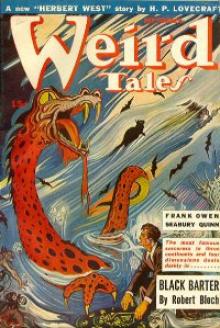 The Geezenstacks
The Geezenstacks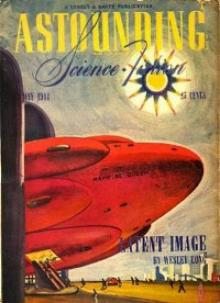 The Yehudi Principle
The Yehudi Principle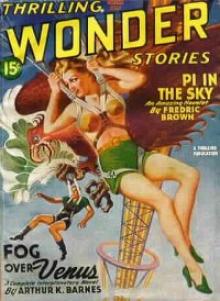 Pi in the Sky
Pi in the Sky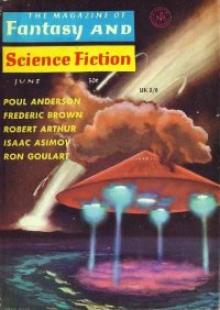 Eine Kleine Nachtmusik
Eine Kleine Nachtmusik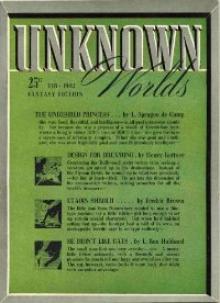 Etaoin Shrdlu
Etaoin Shrdlu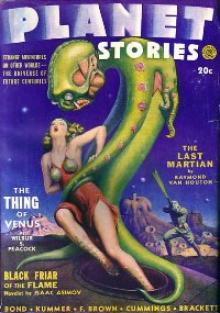 The Star Mouse
The Star Mouse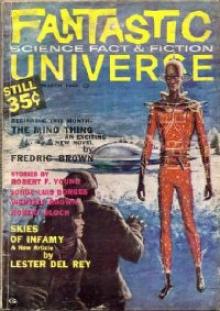 The Mind Thing
The Mind Thing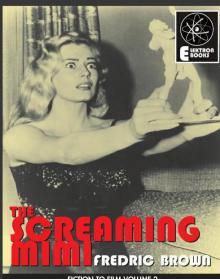 The Screaming Mimi
The Screaming Mimi The Fabulous Clipjoint
The Fabulous Clipjoint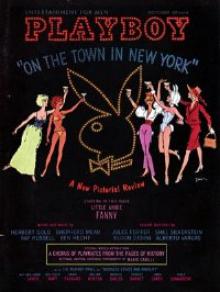 Puppet Show
Puppet Show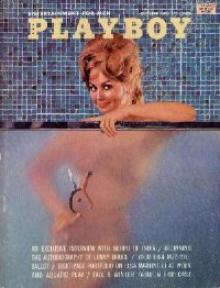 It Didn't Happen
It Didn't Happen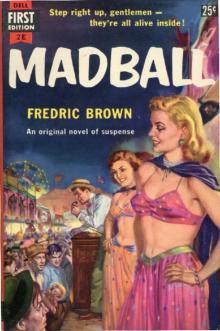 Madball
Madball Happy Ending
Happy Ending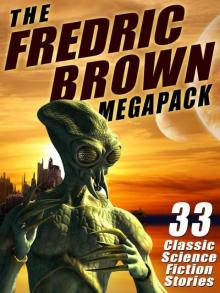 The Fredric Brown Megapack: 33 Classic Science Fiction Stories
The Fredric Brown Megapack: 33 Classic Science Fiction Stories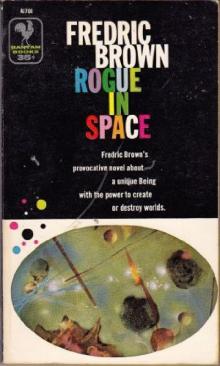 Rogue in Space
Rogue in Space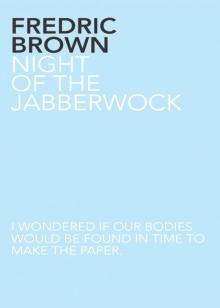 Night of the Jabberwock
Night of the Jabberwock The Dead Ringer
The Dead Ringer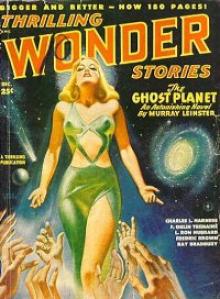 Knock
Knock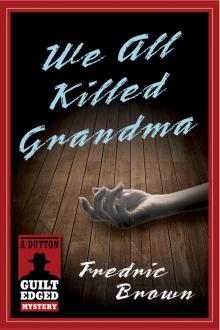 We All Killed Grandma
We All Killed Grandma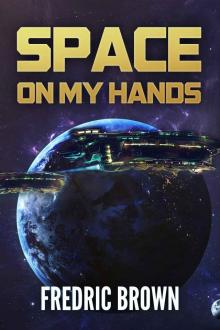 Space On My Hands
Space On My Hands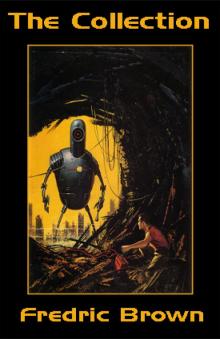 The Collection
The Collection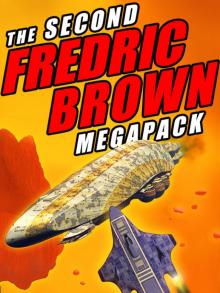 The Second Fredric Brown Megapack: 27 Classic Science Fiction Stories
The Second Fredric Brown Megapack: 27 Classic Science Fiction Stories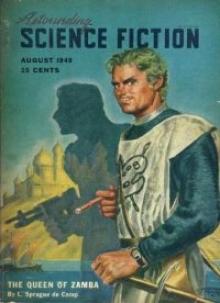 Letter to a Phoenix
Letter to a Phoenix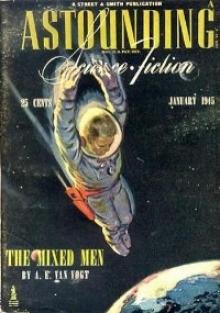 The Waveries
The Waveries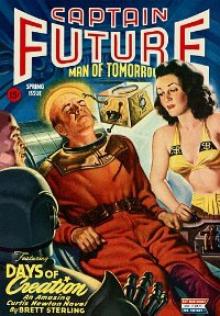 Nothing Sirius
Nothing Sirius The Deep End
The Deep End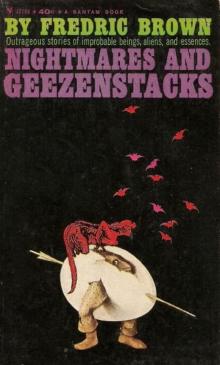 Nightmares & Geezenstacks
Nightmares & Geezenstacks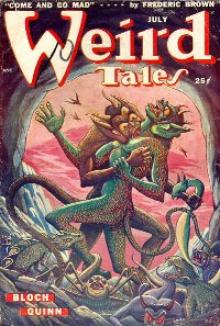 Come and Go Mad
Come and Go Mad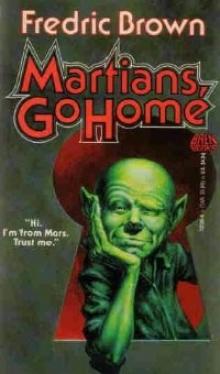 Martians, Go Home
Martians, Go Home